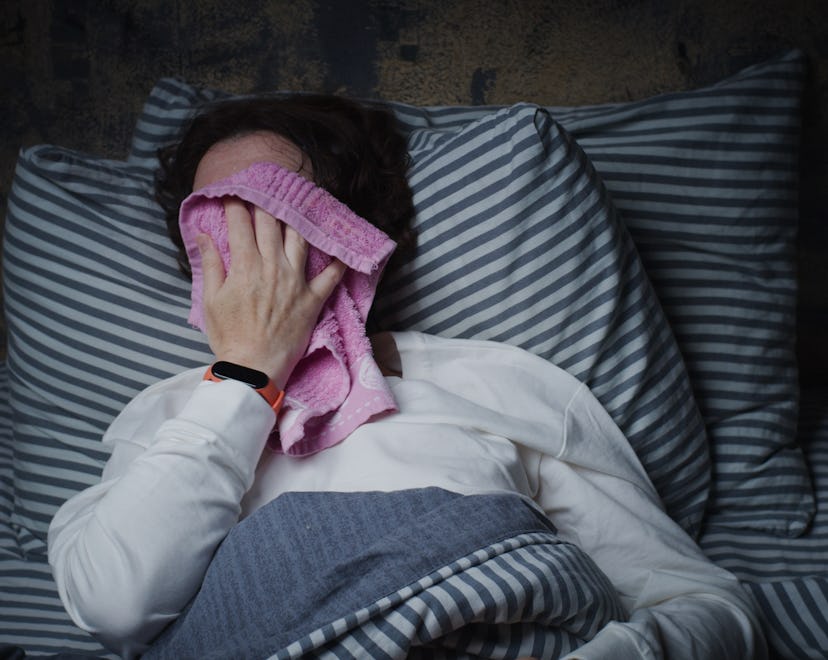Postpartum

Here's The Deal With Postpartum Night Sweats
It’s no fun to wake up soaking wet.
How does your body change after giving birth? An easier answer would be to list the handful of things not affected by your pregnancy and delivery. But if you're thrown for a loop by a sudden increase in perspiration, you're probably interested in finding out what you need to know about postpartum night sweats and how to deal with them. Let's be honest, soaked sheets and permanent pit stains aren't exactly cute or fun to deal with — especially when you're a mom with a new baby. Before you start putting on deodorant before bed or cranking up the AC, it might help to understand what is actually going on in your postpartum body that's causing the increase in sweating.
What causes postpartum sweats?
Why do you suddenly become drenched at the drop of a hat after you have recently given birth? "Your body increases its blood volume by 160% during pregnancy for the placenta and baby's circulation," physician Dr. Aditi Gupta. Jha tells Romper. "After delivery, this volume needs to return back to its original state and one way is to lose water in the form of sweating."
Thankfully this is completely normal and postpartum sweats are just one method your body uses to shed the excess fluids. From a higher blood volume to the fluid retention, these were just some of the ways your body stored necessary nutrients during your pregnancy.
How long does postpartum sweating last?
Twenty-nine percent of women experience hot flashes with postpartum night sweats after delivery, a 2013 study published in Fertility & Sterility found. The researchers found that “over a quarter of women reported hot flashes in the postpartum, peaking at week two and declining thereafter.” But that doesn’t mean the sweats stop then.
"I tell my postpartum clients, prepare for the bedroom to become the locker room," says Desirae Whittle, a doula with Harmony Births.
Some women might experience a drenched feeling even longer, especially if you’re breastfeeding, according to Karrie Locher, an RN and postpartum expert.
Understandably, a few weeks may seem like a lifetime when you're counting down the days until your sweaty days and uncomfortable nights are a thing of the past.
When should you see a doctor about postpartum sweat?
If your perspiration continues to persist beyond the average time frame or you're simply concerned that there may be a more serious underlying cause, you're not alone. As far as when you should start to worry about your sweats, "if you're concerned that you're getting dehydrated, call your provider," says Whittle. As always, trust your gut and don't hesitate to reach out for help. Even if a medical physician determines that your sweating is caused by something more serious, like an infection, it's still a fairly easy condition to treat.
How can you cope with postpartum night sweats?
In the meantime, don't lose hope just yet. There are actually quite a few ways that you can comfortably cope with the potentially annoying excess fluid loss.
"First, prepare for them. I tell clients to drink loads of water. The more water you have, the more will flush out," says Whittle. She also suggests managing sodium. "To keep yourself cool, put a fan next to your bed and try the trick I use when potty training: layer a mattress protector, then a sheet, then another mattress protector and a sheet," she says. Then when your bed becomes overwhelmed with postpartum night sweats, just strip a layer and go back to sleep. Also, Whittle suggests keeping a couple sets of pajamas folded nearby so you can quickly change in the middle of the night.
Staying hydrated can be even more important if you are breastfeeding, since your body has to burn energy to produce milk. Keeping the house comfortably cool, prepping your bed, and drinking plenty of fluids are all great ways to navigate your postpartum sweats with ease.
And like all the trials and tribulations with pregnancy, remind yourself: this too shall pass.
Studies Referenced
Thurston, R. C., Luther, J. F., Wisniewski, S. R., Eng, H., & Wisner, K. L. (2013). Prospective evaluation of nighttime hot flashes during pregnancy and postpartum. Fertility and sterility, 100(6), 1667–1672. https://doi.org/10.1016/j.fertnstert.2013.08.020
Expert
Dr. Aditi Gupta. Jha, Max Healthcare, linkedin.com/in/dr-aditi-gupta-jha-58195767
Desirae Whittle, Harmony Births Doula Services, harmonybirths.com
This article was originally published on